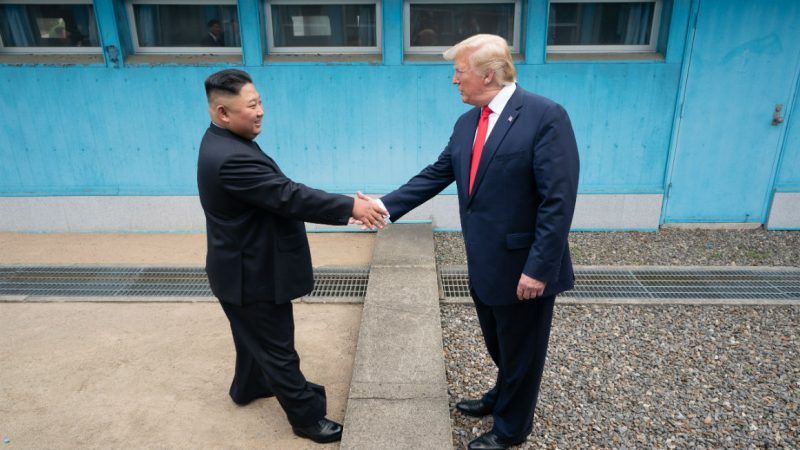Give Nuclear Freeze a Chance
Integrating North Korea into the global economy, not forcing denuclearization, is our best chance at improving ordinary citizens’ quality of life.

President Donald Trump's unprecedented visit to North Korean soil was followed Sunday by a New York Times report that his administration is seriously considering a "nuclear freeze" deal. The Times described the concept—which, if implemented, would have far more lasting ramifications than Trump's much-analyzed jaunt across the demilitarized zone (DMZ)—as one which "essentially enshrine[s] the status quo," permitting Kim Jong Un to retain the nuclear arsenal he has now and receive some sanctions relief in exchange for a moratorium on all future nuclear weapons development.
By Monday morning, National Security Advisor John Bolton, the proposal's chief opponent according to the Times, had flatly denied the report on Twitter. "I read this NYT story with curiosity,"Bolton tweeted. "Neither the NSC staff nor I have discussed or heard of any desire to 'settle for a nuclear freeze by NK,'" he continued, closing with a conspiratorial allegation that the article is "a reprehensible attempt by someone to box in the President," plus a vague call for "consequences."
In many White Houses, this denial might be the final word on the administration's perspective, but this mercurial administration eludes that interpretation. The president's approach to North Korea often seems to differ from Bolton's absolutist tack, and his stated preference for opaque messaging in foreign policy could also be in play. Contra Bolton, the freeze deal may indeed be on the table—and so it should be.
Pursuing this plan is not, as interventionist hardliners like Bolton might claim, an exercise in appeasement for a hideously brutal regime. It is a prudent recognition of reality which could serve as a key step toward peace on the Korean Peninsula and, in time, greater liberty and prosperity for the North Korean people.
And it is those two ends, more than denuclearization itself, which should be Washington's goals for realistic engagement with Pyongyang. This becomes obvious if we recognize three facts: First, Kim will not willingly denuclearize so long as he considers nukes necessary to regime survival. Second, war to relieve Kim of his weapons would be disastrous even with a quick nominal victory, causing enormous civilian suffering and economic disruption that would take decades to repair. Third, opening North Korea to international trade and cultural influences may be its people's best shot at freedom and comparative normalcy.
Evidence for the first fact abounds in both Pyongyang's behavior and words: Kim sees his nuclear weapons as the sole effective insurance available against U.S.-orchestrated regime change. "History proves that powerful nuclear deterrence serves as the strongest treasure sword for frustrating outsiders' aggression," his government has argued, explicitly pointing to U.S. interventions in Iraq and Libya as proof that the risk it perceives is real. Trump's selection of Bolton—a longstanding advocate of forcible regime change in North Korea and elsewhere—can only exacerbate this suspicion.
Polling shows three in four Americans already realize Pyongyang is unlikely to denuclearize any time soon, and Washington would do well to catch up. Insisting on complete denuclearization ensures stalemate in U.S.-North Korea relations at best. At worst, it will usher us into a devastating war. The hardline position is a reckless step toward avoidable conflict.
And the plausible outcome of such a war is undeniable. Though Kim could never pose an existential threat to the United States, he could and would wreak enormous anguish once attacked. If a U.S. offensive makes Kim's retention of power inconceivable, there is every reason to anticipate a response of indiscriminate destruction. Pyongyang could easily use its nuclear, chemical, biological, and conventional weapons to inflict unspeakable damage on civilian populations in Seoul—a city of 25 million people, just 35 miles from the North Korean border—to say nothing of U.S. military members, their families, and their South Korean allies near the DMZ. Close quarters on the peninsula guarantee mass casualties in the initial battle, to say nothing of the permanent guerilla warfare, nation-building, and occupation that would follow, if recent U.S. interventions elsewhere are any guide.
Though we might hope a North Korea freed from Kim's oppression would promptly become a modern, healthy society, those hopes would probably go unfulfilled for years. The effects of life in a murderous prison state cannot go away overnight, and what we know of Pyongyang's exhaustive brainwashing apparatus suggests U.S. invasion would not be immediately welcomed by many. While far from ideal—no one of good conscience wishes for Kim to remain in power for even a single second longer—the slower and more peaceful approach of integrating North Korea into the global economy is our best chance at improving ordinary North Koreans' quality of life. It may even empower them to demand the political change they desperately need and deserve.
Prioritizing peace and progress for the North Korean people instead of making a maximal denuclearization demand may entail an intermediary deal like the one in the Times' Sunday report. The good news is it just might work.
Backed by the indefinite deterrence assured by America's unparalleled military might, what this gradual strategy of local-led diplomacy and international trade lacks in naïve simplicity it makes up for by offering a real shot at success.


Show Comments (44)